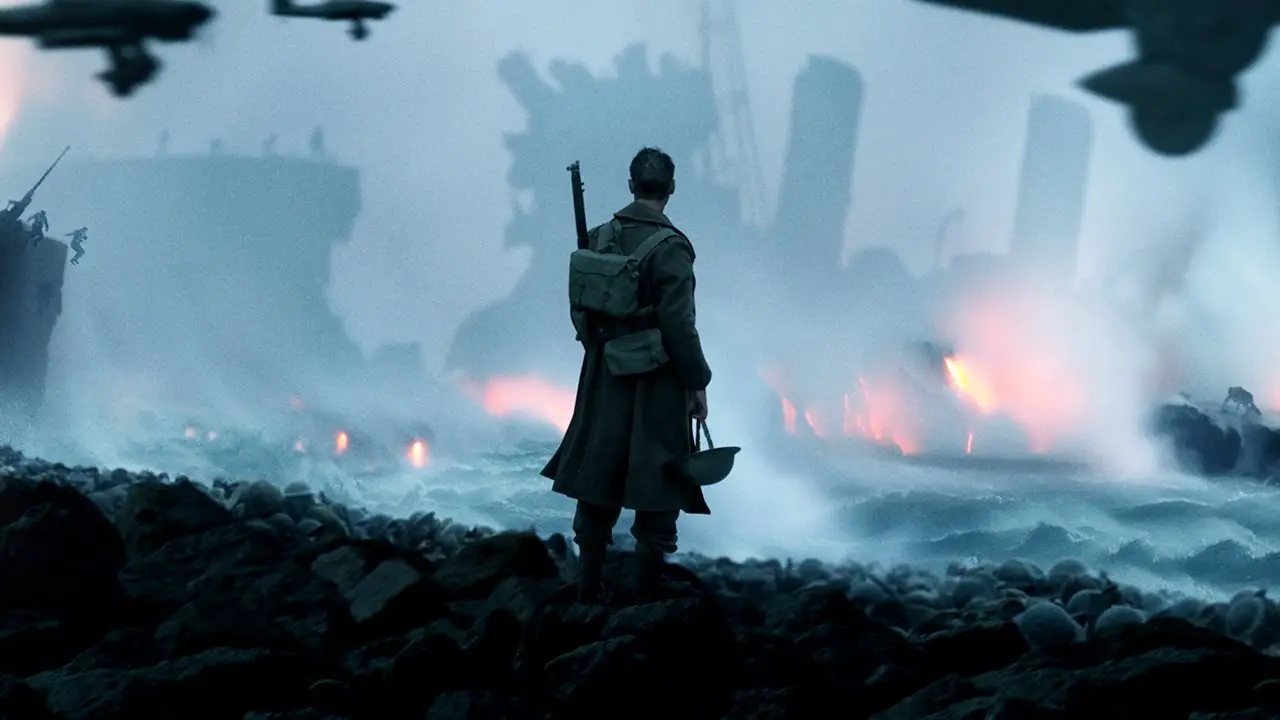Ever since his 1998 directorial debut Following, one of the most prominent recurring themes throughout Christopher Nolan’s filmography is the concept and fragmentation of time. From Momento’s amnesiac hero Leonard who can’t remember the past, to Batman who has to stop a ticking nuclear bomb in The Dark Knight Rises, to Cooper fighting gravitational time dilation in Interstellar, time is something that drives almost all of his heroes.
 Nolan’s latest film Dunkirk, based on the Dunkirk evacuation of the Second World War, centers on the four hundred thousand soldiers waiting for deliverance. Their enemy is not the German army, depicted here as a specter-like presence, but time itself as they try to survive by any means necessary until they can get home.
Nolan’s latest film Dunkirk, based on the Dunkirk evacuation of the Second World War, centers on the four hundred thousand soldiers waiting for deliverance. Their enemy is not the German army, depicted here as a specter-like presence, but time itself as they try to survive by any means necessary until they can get home.
There have been numerous films that are based on this subject, from Leslie Norman’s 1958 film of the same name to the five-minute one-take sequence in Joe Wright’s Atonement. Nolan takes an unconventional approach to the historical event by interweaving three storylines covering different scopes of time during the evacuation. Once again, Nolan presents a non-linear narrative. Unlike some of his previous films though, Dunkirk is kept short and focused, which is one of the film’s biggest advantages.
 With stunning cinematography shot on IMAX 65mm film (see it in the IMAX format, it’s a must) by Hoyte van Hoytema, there is a strong sense of intimacy for such a large-scale story. Whether it is the private boat of Mark Rylance’s Mr. Dawson, the cockpit of Tom Hardy’s Royal Air Force pilot or running alongside British Army privates played by newcomer Fionn Whitehead and One Direction’s Harry Styles, the film never loses the human stories. The historically accurate design and practical effects further increase the brutal realism Nolan expertly captures.
With stunning cinematography shot on IMAX 65mm film (see it in the IMAX format, it’s a must) by Hoyte van Hoytema, there is a strong sense of intimacy for such a large-scale story. Whether it is the private boat of Mark Rylance’s Mr. Dawson, the cockpit of Tom Hardy’s Royal Air Force pilot or running alongside British Army privates played by newcomer Fionn Whitehead and One Direction’s Harry Styles, the film never loses the human stories. The historically accurate design and practical effects further increase the brutal realism Nolan expertly captures.
Given its ensemble of British acting veterans such as Mark Rylance, Kenneth Branagh and previous Nolan collaborators Tom Hardy and Cillian Murphy, Dunkirk is not consumed by character backstory nor big speeches, frequent trappings of war movies. Audiences might feel distant from the shallow characterization, but Nolan is more interested how this fight for survival psychologically motivates the soldiers rather than aggrandizing them.

In the end, Dunkirk is a rather atypical war movie. Enemies are unseen, words are unspoken, and the heroes are just trying to stay alive. In this stunningly tense, thoughtful film, time and survival waits for no man.
Join the AIPT Patreon
Want to take our relationship to the next level? Become a patron today to gain access to exclusive perks, such as:
- ❌ Remove all ads on the website
- 💬 Join our Discord community, where we chat about the latest news and releases from everything we cover on AIPT
- 📗 Access to our monthly book club
- 📦 Get a physical trade paperback shipped to you every month
- 💥 And more!














You must be logged in to post a comment.